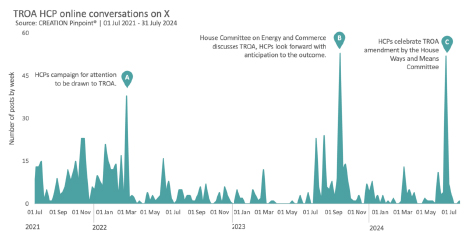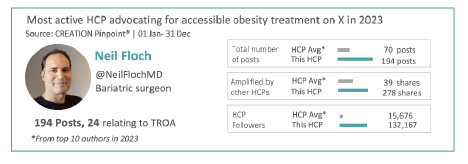Social media advocacy: Healthcare professionals and the Treat and Reduce Obesity Act

Social media is a hub of opinion, argument, and advocacy that traverses a virtually endless spectrum. Among the most active voices in this environment are healthcare professionals (HCPs).
Beyond general debate and discussion on a variety of health topics, we have found that HCPs regularly use social media to champion causes they are passionate about, and to mobilise support for change in particular healthcare spaces. One compelling recent example has been HCP advocacy in obesity.
At Creation Healthcare, we conducted an analysis of the obesity-related social media conversations of healthcare professionals between July 2021 and July 2024, aiming to uncover what exactly was driving discussions across the world.
We found that concerns about the barriers to accessing obesity treatments, including restrictive insurance coverage, medication shortages, and obesity stigma, were prominent features of HCP conversations.
Despite promising new drugs entering the market, such as tirzepatide and semaglutide, HCPs continued to report that the “sheer amount of time and resources” it can take to encourage insurance companies to approve medications remains a major barrier to treatment access.
Central to the campaign to improve obesity treatment access has been the Treat and Reduce Obesity Act (TROA), “a bipartisan bill in the US aimed at expanding Medicare access to obesity treatments, including FDA-approved medications and intensive behavioural therapy (IBT)”, which was approved by the House Ways and Means Committee in June 2024. In fact, between July 2021 and July 2024, HCPs mentioned the Treat and Obesity Act in 13% of their 6,068 online posts on X about obesity treatment accessibility.
This article explores how HCP conversations around the Treat and Reduce Obesity Act evolved between July 2021 to July 2024.

1. HCPs campaign for TROA attention
By late 2021, we found that HCPs were already active on X promoting the Treat and Reduce Obesity Act, particularly to stress the urgency of its passage in the legislature. One HCP described the Act as a “bill that MUST become law”, given the challenges that obesity poses to wider disease outcomes across the United States. While attempting to muster support for the Act among peers, Christine Lovato argued that “making obesity treatment a priority for lawmakers is the best way to work to prevent and treat this disease”. The consistent message in HCP conversations was that TROA was essential for addressing the “obesity crisis”.
The first significant spike in conversations related to the Act came on 4th March 2022 – World Obesity Day. HCPs used the hashtag #OCW2022 (Obesity Care Week, 2022) to push for support of the Act, and alongside it a real effort to address challenges in accessing obesity care. In one post, Fatima Cody Stanford, MD, rallied against congressional indecision when it came to the Act, arguing “we must do better!”
To intensify their efforts, some HCPs began tagging senators directly, while others urged followers and peers to call directly on their respective congressional representatives to support the bill. In one post advocating for TROA’s introduction, Jasleen Chhatwal, MD, argued that the Act would “remove barriers” for individuals with obesity. Chhatwal also highlighted the impacts of obesity on minority ethnic communities, and called on her two Senators to “support #TROA.”
Other healthcare professionals amplified – through reposts – the voices of individuals with obesity, who shared their own stories on social media about treatment access, and called for the Act’s passing.
By 10th June 2022, TROA had reached 167 congressional supporters. Although the online HCP movement was gaining momentum, by the end of 2022 Neil Floch, MD, suggested that the bill remained “largely ignored by the US government” – a result of “a stigma to #Obesity as a disease and discrimination [against] obesity as a treatment [indication].”
2. HCPs energised as TROA reintroduced to congress
Despite this, we found that significant numbers of HCPs remained keenly engaged in supporting TROA into 2023. Of these, Neil Floch, MD, proved the most active author. Floch advocated for improved access to obesity treatments in 194 posts, 24 of which specifically focused on the Treat and Reduce Obesity Act. His posts were shared 278 times by HCP peers. Floch frequently discussed the struggle for equitable coverage of obesity treatments, and shared articles reporting on how failures to expand insurance to medications like Ozempic and Wegovy was putting treatments “out of reach for older Americans”.

HCPs actively participated in a variety of advocacy activities throughout 2024, which they shared news of on social media. These ranged from hosting webinars on the state of obesity care in the US to attending the The American Society for Metabolic & Bariatric Surgery’s ‘ObesityPAC’ reception.
When the Treat and Reduce Obesity Act was re-introduced to Congress on 21st July 2023, 19 HCPs used social media to express their gratitude, thanking Senators directly for their “support on this important topic”.
A significant development in online conversation occurred on 19th September, when the House Committee on Energy and Commerce discussed the TROA. 24 HCPs closely followed these proceedings, commending members of the committee for their dedication to advancing what they perceived as critical healthcare legislation.
While the hearing brought attention to the bill, it did not result in immediate legislative passage. HCPs nonetheless continued to “hope” for progress. Endocrinologist Beverly Tchang shared a blog post from obesity advocate Ted Kyle that summed up 2023 efforts: “Public pressure is building for better access to obesity treatments.”
3. HCPs celebrate TROA amendment
In the first half of 2024, HCPs continued to actively contribute to online conversations around TROA. We tracked the social media activity of 50 of these HCPs, finding that they collectively posted over 120 times about the Act. As the House Ways and Means Committee prepared for a crucial vote in June of 2024, HCPs amplified their calls for the bill’s passage. For registered dietician Connie Diekman, the message was clear: “We need passage of #TROA so more people can access care!”
In anticipation of the 27th June decision, HCPs shared the Obesity Action Coalition’s “ACTION ALERT,” which emphasised the importance of the Act in expanding obesity treatment coverage to older adults on Medicare. Ted Kyle labelled the markup an “important step” towards enhancing treatment access for Medicare beneficiaries.
When the Ways and Means Committee passed the amended version of TROA with a bipartisan vote of 36-4, HCPs shared posts in celebration, relief, and optimism. Celebratory posts praising the decision as “big news” and a “step in the right direction” drove a 2,500% increase in the average volume of conversation. Neil Floch, MD, posted: “we are FINALLY on the road to progress”, while Ted Kyle said: “After a decade of toiling away for this, we need a pinch to assure ourselves it’s real.”
The story of HCPs’ advocacy for the Treat and Reduce Obesity Act reveals a broader truth: HCPs care deeply about the real-world implications of legislation, especially when it affects patient health. Their social media conversations make clear that access to obesity treatments, equitable healthcare, and reducing stigma were key priorities.
Social media has proven to be a powerful tool for HCPs to amplify their voices, raise awareness, share updates, and rally support for legislative changes that have tangible and positive effects on patient outcomes.
link






